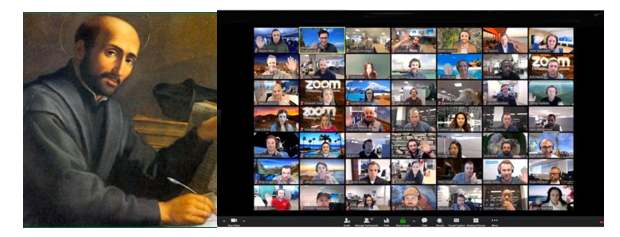The virtual reality of our study and work has inspired all kinds of innovation at Georgetown. Spiritual formation programs have also embraced digital tools and platforms to support the university’s commitment to whole person development. This year’s SCS Staff and Faculty retreat was a great example of how traditional ways of proceeding can be imagined anew in these virtual times.
This year’s retreat for staff and faculty, “An Ignatian Retreat in the Age of Zoom: Meditating on Faces & the Image of God,” was led by two Jesuits, Fr. Mark Bosco, vice president for mission and ministry, and Fr. Jerry Hayes, director of Ignatian programs, along with Jamie Kralovec, SCS associate director for mission integration. Frs. Bosco and Hayes designed the template for the retreat and have been extending invitations to offices and departments across the university to experience the virtual program.

At the heart of this virtual Ignatian retreat, which lasts between 60 and 75 minutes, is a deeper contemplation of human faces and the way that these faces point us in the direction of the Divine. The retreat is a creative take on Zoom fatigue (which we discussed on Mission in Motion a few months ago). While virtual living, working, and studying pose significant challenges and stresses, “An Ignatian Retreat in the Age of Zoom” invites retreatants to ponder the deeper spiritual significance and potential for greater solidarity in contemplating the faces on our screens: “the face both reveals and conceals, drawing us into new ways of experiencing both our shared humanity, and our sense of the Divine shining through the face of the other.”
The retreat then deepens exploration of faces and the image of God through readings of the poem “As Kingfishers Catch Fire” by Jesuit Poet Gerard Manley Hopkins and an Examen meditation (described here on Mission in Motion) about the faces that we encounter each day. The point of these exercises is to invite retreatants to consider what is happening in their interior experience as they go about each day processing an overwhelming amount of visual data (and faces) on screens. Some questions to consider from a virtual day of life, work, and study:
What faces do I encounter in my day that bring me joy and remind me of the goodness and joys of life?
What faces in my day challenge, irritate, or annoy me?
What faces do I intentionally choose to ignore and exclude from my vision?
How can I enter into my next Zoom meeting with a reverence for the innate sacredness and human dignity of each face I contemplate? How do I recall that every face I meet, even the ones that challenge me, is an opportunity to gaze upon a glimpse of the Divine?
At Georgetown, living out the value of being Contemplatives in Action means taking needed time for pause, reflection, and spiritual grounding. Last year’s staff and faculty retreat was a time of community and inspired reflection, providing participants with some helpful rest and rejuvenation for the coming academic year. Attendees of last year’s student retreat had similar feelings about the retreat experience (read more in Mission in Motion about last year’s student retreat). And this year’s staff and faculty retreat made clear that we can acknowledge and accept the many limitations and constraints of this virtual environment while finding in it some unexpected graces and the potential for greater shared humanity.
This year’s retreat produced some helpful lessons about how best to design spiritual experiences in the age of Zoom. In the coming weeks, we will share additional ways that students and alumni can directly experience the transformative benefits of a virtual Georgetown retreat.
